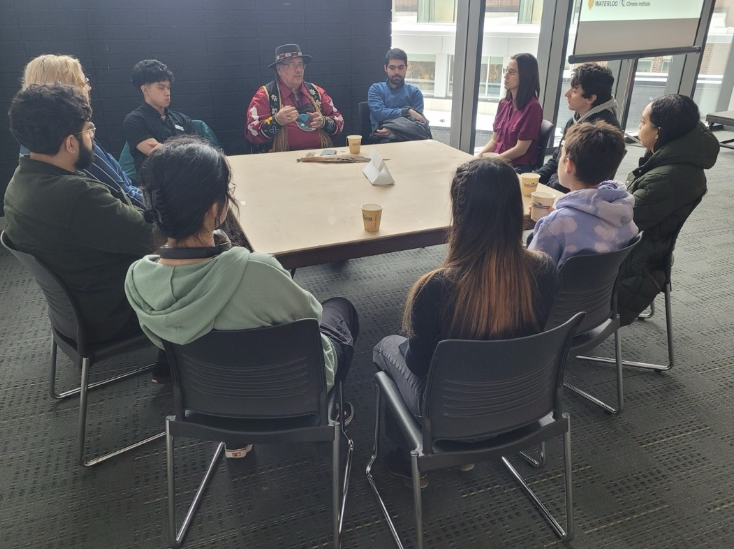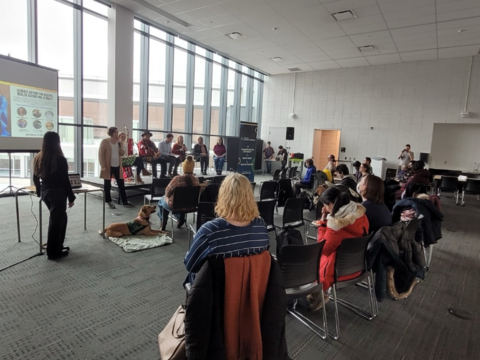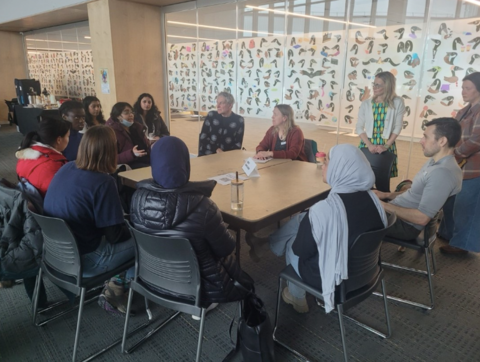Climate Change is a Pressing Concern for Health Students on the Frontlines of the Crisis
The intersection of health and climate change has come into focus recently, with a health and climate event hosted by the Waterloo Climate Institute. The panel highlighted the need for increased education and awareness for students. The event brought together key speakers, including Indigenous Elder Myeengun Henry, who shared Indigenous perspectives on climate change. Sharon Kirkpatrick and Warren Dodd from the Faculty of Health provided insights into research in migration and health, community food security, healthcare and social service access, and climate change. Huda Nasir and Aline Priscila de Souza, undergraduate and graduate students in Public Health, shared their passion for climate activism and health research. PhD candidate Joslyn Radcliffe shared valuable insights and perspectives as a former nurse on the implications of climate change for health.

Post-panel discussion with Elder Myeegun Henry.
An event for idea-sharing on climate change
One of the main objectives of the event was to stimulate conversations about the implications of climate change for health and provide a forum for interdisciplinary networking and idea-sharing. The key speakers addressed important questions such as leveraging opportunities within the Faculty and University to integrate meaningful learning and action related to climate and health and identifying barriers and strategies to overcome them.
During the break-out discussion, students expressed a strong interest in pursuing careers that combine health and climate change but felt that they lacked the guidance and resources to navigate potential employment pathways. Many students expressed a desire for more information on how they can make a difference in addressing the health impacts of climate change, both in clinical practice and in public health settings.

Indigenous perspectives provide pathways forward
A key takeaway noted by the participants, was the interest among students in learning more about Indigenous perspectives on the subject matter. Students recognized the importance of incorporating diverse perspectives into their education and felt that Indigenous knowledge could provide valuable insights into addressing the health impacts of climate change in a culturally sensitive and appropriate manner.

Post-panel round-table discussion with Josalyn Radcliffe
A call for more integrated climate change education
Another common theme among attendees was the desire for more guest lectures on climate change and health, particularly in the earlier years of their undergraduate program. Many students felt that discussions on climate change were often left until the latter years of their program and expressed a desire for more exposure to these topics earlier in their academic career.
In response to these findings, attendees suggested the creation of a minor program in climate change and sustainability within the Faculty of Health. Introducing a minor in this field would provide students with a more comprehensive understanding of the intersection of the two and make the program more attractive to those interested in pursuing careers in the field.
Overall, the event highlighted the growing interest among health students in addressing the health impacts of climate change and the need for greater education and support in this area. By incorporating more discussions on climate change and health into the curriculum, providing resources for students interested in pursuing careers in this field, and offering opportunities for exposure to diverse perspectives, universities can better prepare future healthcare professionals to address the challenges of a changing climate.
Written by Fatima Patka